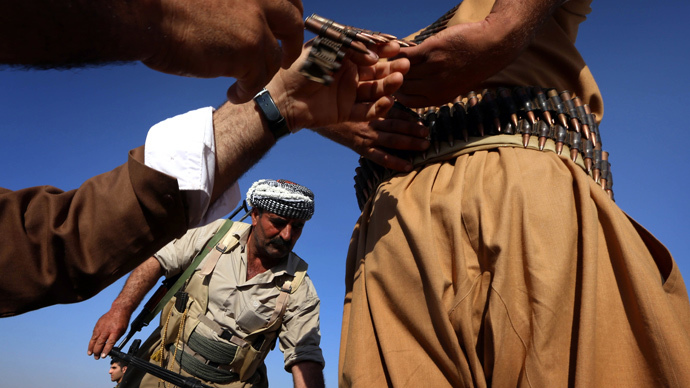‘US involvement in Iraq must be part of regional coalition's efforts’

To stop the havoc in Iraq and the whole Middle East, the US and its Western allies must reconsider their entire regional policy and act as part of a coalition of regional state actors, writer and journalist John Wight told RT.
RT:We’ve recently heard from the White
House that they could be ready to deploy the military in Iraq –
but only once a new inclusive government is formed. How does that
stand with President Obama’s assurances that there will not be
boots on the ground?
John Wight: Well, isn’t it ironic that just
three years after the US left Iraq in a worse state in which they
found it, we’re now contemplating US troops returning to Iraq in
large numbers. Only those who have had their humanity surgically
removed could fail to be moved by the plight of these poor people
in northern Iraq right now. And as such, any efforts to alleviate
their plight in the short term must be welcomed. However, the
cause of a problem can never be its solution going forward, and
that is why Washington’s role here must be as part of a coalition
and certainly not taking charge of any military action. So I
would suggest that they go to the UN, remember the UN? They were
supposed to be the arbitrator of international law, it seems to
be bypassed more and more by the West and its allies. To get a
grand coalition, which would have to include Russia, would have
to include China, would have to include Iran, would have to
include all the state actors in the region who have a role to
play and really have to look at the reorientation of western
foreign policy in the Middle East that has to take place because
right now we have a situation where the West is opposing ISIS
rebels in northern Iraq, and rightly so, but has been tacitly or
implicitly supporting them in Syria. It’s madness.
RT:I want to pick up on that, because the
Free Syrian Army, as part of the Syrian opposition, they’ve
pledged their allegiance to the Islamic State. This Syrian
opposition, it’s a force that was long supported and nurtured by
the US, so do we not see a situation now where the US is actually
having to turn its sights on a force that it was actually rearing
for quite a long period?
JW: Absolutely. The entire focus of US/Western
foreign policy in the region has been to isolate Syria, isolate
Iran, and bolster Israel, and that’s now blown back in their
faces. So if they are interested in alleviating and putting out
the fire that is raging across the Middle East, they have to
understand that the divide in the region is not between Sunni and
Shia, it’s not between Muslim and non-Muslim, it’s between
sectarian and non-sectarian. So their role must be to isolate
sectarian forces and to bolster non-sectarian forces. So they
have to also look at their relationship with the Saudi Arabians,
the Qataris, the Kuwaitis, the Gulf States who are fomenting and
funding this chaos in the region and have been for quite a number
of years now.
RT:American taxpayers already bore the
brunt of a very expensive war in Iraq the last time. Do you think
they will be ready to pay for this violence and the expense once
again?
JW: Certainly not. Here we see the growing
disconnect between the American public and the political class in
Washington. When it comes to war, when it comes to subverting
regimes across the world, when it comes to going to war in
service to US corporate business interests, there seems to be a
limitless amount of money within the US government. But when it
comes to alleviating poverty, the growing inequality in the US,
Detroit is bankrupt, there are third world levels of poverty in
most American cities, there’s no money. So I don’t think the
Obama administration has much weight and much credibility with
regard to putting boots on the ground or engaging in the
sustained military effort in the region – or anywhere else for
that matter.
RT:ISIS has been calling on its members to
target all-encompassing US interests worldwide. The US has been
very vocal about its war on terror. Do you think that it’s
perhaps coming back to haunt them to an extent?
JW: It clearly is. Since 9/11, the path taken by
the George W. Bush administration has been an absolute disaster
for the US, for the West, but certainly for millions of people in
the Middle East, who are suffering the depredations of the chaos
that’s being sawn. And so as I said, there has to be a major
reorientation of Western foreign policy towards the region. This
short-termist idea that you can play with fire, that you can grab
a tiger by the tail – that you can support rebels and fanatics
and then, hopefully, they’ll go away, is clearly unraveling
before our eyes. So unless there is a major reorientation, the
chaos will get worse. There has to be an end to the hypocrisy and
double standards, support for the apartheid state of Israel and
its massacre of women and children in Gaza as we speak attempts
to undermine one of the only non-sectarian governments in the
region – the Syrian government – and supporting proxies, whether
it’s in Ukraine, or whether it is anywhere else in the world –
this must come to an end.
The statements, views and opinions expressed in this column are solely those of the author and do not necessarily represent those of RT.
The statements, views and opinions expressed in this column are solely those of the author and do not necessarily represent those of RT.













